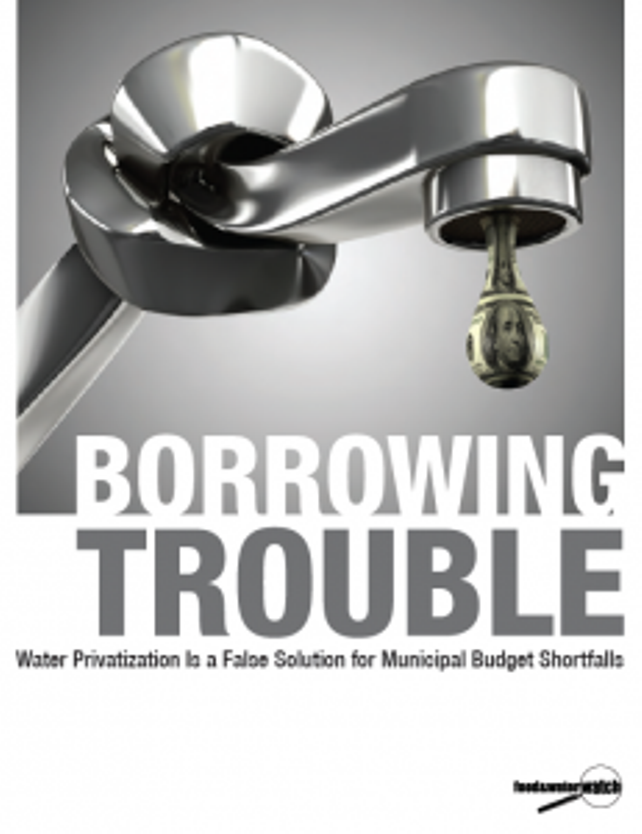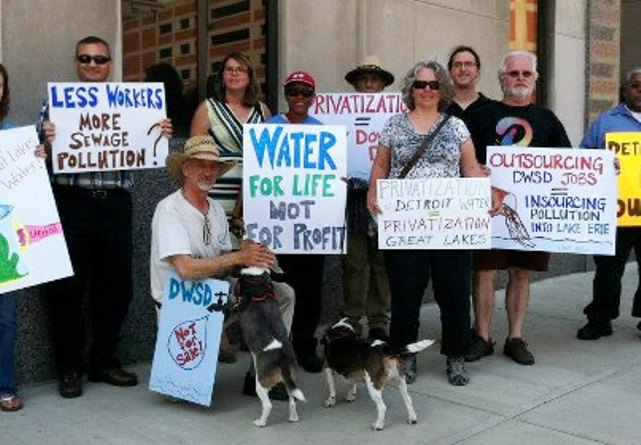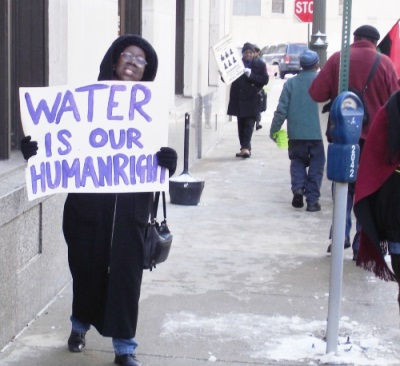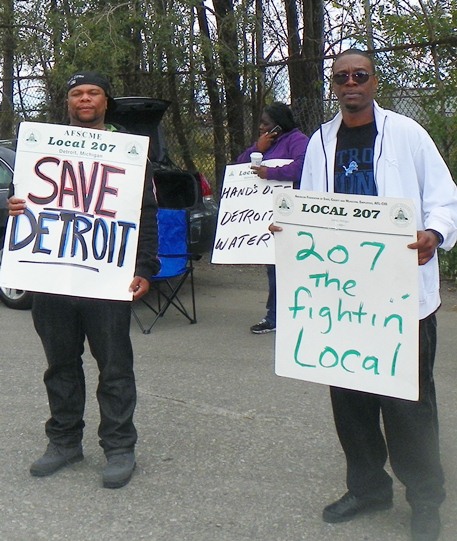
New Food & Water Watch Analysis Highlights Public Costs Associated With Water System Privatization Deals
April 4, 2013
Contact: Tia Lebherz, Food & Water Watch, (313) 486-1356 tlebherz@fwwatch.org
Detroit, Mich. – As Emergency Financial Manager Kevyn Orr works to balance Detroit’s budget in the wake of a state-declared financial emergency, reports indicate he may attempt to raise cash by privatizing Detroit’s drinking water and wastewater systems.
But Borrowing Trouble: Water Privatization Is a False Solution for Municipal Budget Shortfalls, released today by the consumer advocacy organization Food & Water Watch, shows that taxpayers ultimately suffer when water systems are privatized, and that leasing or selling these essential systems simply masks, not alleviates, local budget shortfalls.
“Privatizing Detroit’s water and sewer system will do nothing to alleviate the city’s financial problems,” said Tia Lebherz, a Detroit-based organizer for Food & Water Watch. “Doing so would amount to a one-shot ploy to obscure larger money woes, and would ultimately come back to haunt residents in the form of higher bills.”
Although more than 80 percent of water systems worldwide are publically owned and controlled, the collapse of global financial markets in the 2000s has led many governments around the world to consider privatizing these assets through arrangements such as concession contracts, where a municipality retains ownership of a system, but the corporation that has assumed control is responsible for setting rates and financing system upkeep.
In these deals, the private company will give a local government what is effectively an upfront loan for control of its water system, while ratepayers, not the municipality, are expected to repay the loan through rate increases and other fees.
Because ratepayers must repay the loan from the company leasing their water system, water bills will increase. The more money a local government receives from the deal, the more households and local businesses will pay through their water bills.
“Water privatization would disproportionately affect poor and working class families across Southeast Michigan who are already unable to keep up with water rate increases,” said Ann Rall of the Michigan Welfare Rights Organization. “Our water system should provide the highest quality service at the most affordable price to ensure that all can have access to safe drinking water and sanitation. The regressive rate hikes that would occur with privatization would place an unfair burden on those less able to pay. Privatization would also increase the already-staggering level of unemployment in this region.”
Concession contracts are far more expensive than the common form of government borrowing on the municipal bond market. The upfront loan can have an interest rate of 14 percent or higher, while local government debt typically has an interest rate of about 4 percent. For similar reasons, concession contracts have also been shown to drive up the cost of system improvements, adding $0.8 million to $2.5 million onto the total cost of every $1 million investment.
“In Detroit, both the Emergency Financial Manager and the Board of Water Commissioners have expressed that they are interested in pursuing the privatization of DWSD, either through the sale or lease of the system,” said Ken Gray, member of AFSCME Local 207. “However, we know, and this report confirms, that such an irresponsible and short sighted decision will not create a balanced budget but rather will dig Detroit into a deeper hole of long term financial instability.”
Food & Water Watch recommends that Kevyn Orr reject the idea of privatizing Detroit’s local water and sewer systems, as doing so will not provide a real, sustainable and responsible solution for the city’s financial shortfall. Policymakers should grant the public access to all information regarding potential privatization contracts, encourage public input and require a referendum on any proposed lease, concession or sale of a public drinking or wastewater system.
Borrowing Trouble: Water Privatization Is a False Solution for Municipal Budget Shortfalls is available here:
http://foodandwaterwatch.org/reports/borrowing-trouble-water-privatization-is-a-false-solution-for-municipal-budget-shortfalls/
Food & Water Watch works to ensure the food, water and fish we consume is safe, accessible and sustainable. So we can all enjoy and trust in what we eat and drink, we help people take charge of where their food comes from, keep clean, affordable, public tap water flowing freely to our homes, protect the environmental quality of oceans, force government to do its job protecting citizens, and educate about the importance of keeping shared resources under public control.
Tia Lebherz
Organizer
Food & Water Watch
2727 2nd Ave, Suite 136
Detroit, MI 48201
Office: 313.486.1356
Cell: 310.963.0789
Fax: 313.486.1357
tlebherz@fwwatch.org
http://www.foodandwaterwatch.org/
Related articles:
http://voiceofdetroit.net/2012/09/27/detroit-dwsd-debt-shows-wall-street-never-loses-on-bad-swaps/
http://voiceofdetroit.net/2012/11/19/pro-tem-brown-in-bed-with-bowc-water-contractors/








